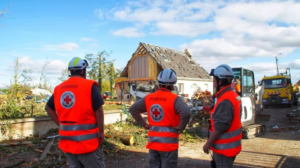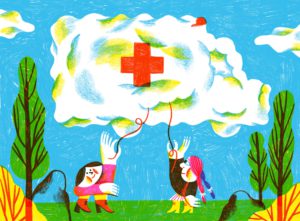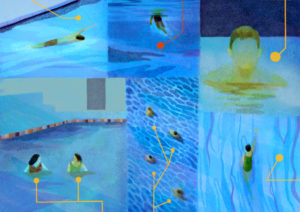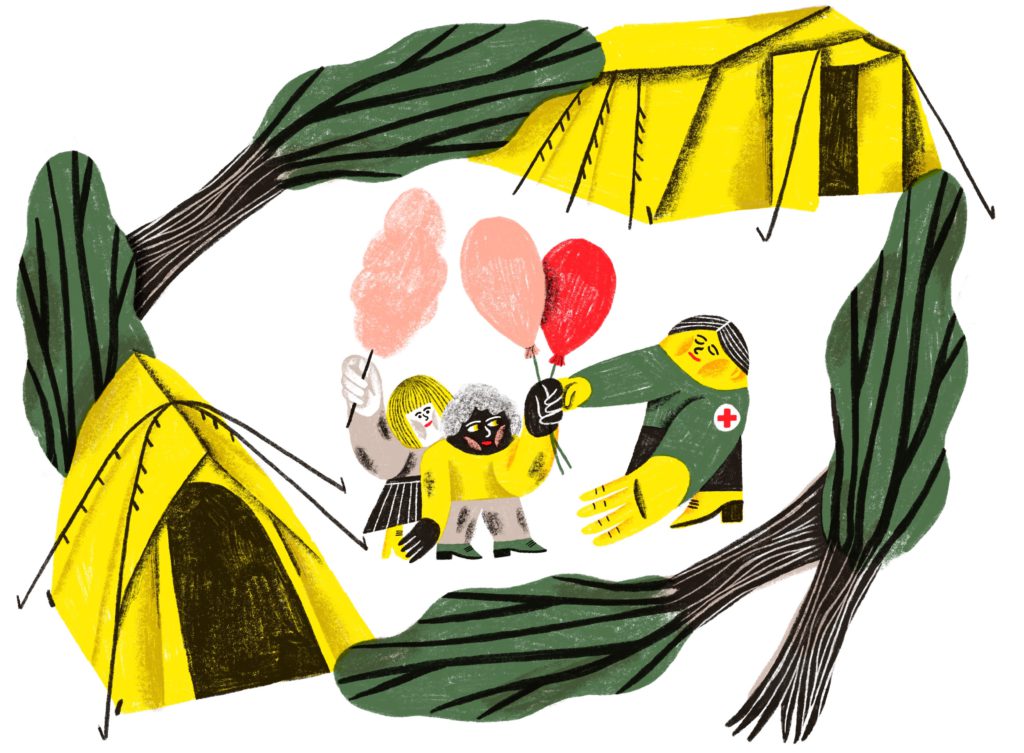
Alice Piaggio
Description
Bihucourt is a rural community with a population of 8 00, 50% of which was destroyed by a tornado on 23 October 2022. An hour after the tornado struck, the Pas-de-Calais Red Cross arrived on the scene to assess the damage and set up the CAI (Reception Centre) in the hall of the town hall. Very quickly, the massive influx of residents and the lack of space forced them to move out and set up camp on a vacant lot opposite the town hall, with no electricity or internet.
Some houses no longer had floors, others were gutted, and the fire brigade forbade entry to the dwellings. Residents turned to the Red Cross to ask for clothes, shoes, children’s clothes, nappies, bottles, milk, etc. Deliveries were made directly from the nearest local units.
Context
The request from local residents was passed on to the changing rooms in the surrounding local units. The volunteers then decided to come and set up an adult and children’s changing room on site.
Two tents were erected to hold the racks, one for storage, and a fourth tent was dedicated to food (milk, water, etc.). The tents were positioned around the CAI, where a large number of disaster victims arrived. Most of them are very shocked: they need to sit down and talk.
There are a lot of people: the gendarmerie, the police, an emergency architect, Enedis for the electricity, and even tractors clearing the roads. Fortunately, the gendarmes have blocked off the entrances to the commune, preserving the group’s privacy.
The Town Hall is offering to order the meals. Breakfast, lunch and dinner. A large 50m² tent was set up, along with tables and chairs.
6 hours after the tornado hit, many things had been achieved:
- Creation of the “village square”: a place to live in the midst of disaster, destroyed houses and uprooted treesThe CAI became the village café and restaurant.
- Installation of the adult changing room and the ready-to-wear shop;
- A children’s shop and a nursery and toy shop are set up;
- Setting up food aid and the village grocery shop
“There are still two tents in the lorry, they have been set up and will be used to fill in the forms with the residents”, explains a volunteer on site. The service providers and associations present settle in with a coffee to take stock of the situation among themselves and with the residents.
There are so many people there all day that the place becomes a real living space called “the village of solidarity”. It’s a place full of emotions: we cry when we hear the news from the insurance companies or the emergency architects, but we laugh and rejoice when we hear the good news from the disaster victims.
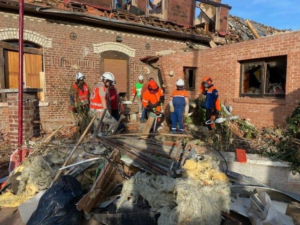
Technical details & Operations
A typical day
- 7am – breakfast: coffee, tea or hot chocolate served
- 12pm – lunch: 350 hot meals served and 50 sandwiches distributed on average
- 6.30 p.m. – Dinner: 230 meals served on average, exclusively for disaster victims
- The village closes at 9pm
Volunteer involvement
Sixty volunteers are mobilised around the clock.
Every morning, a lorry passes by a bakery in a neighbouring commune to pick up breakfast pastries and bread. The Restos du Coeur provides supplies for the grocery shop in the solidarity village, and Emmaüs opens a warehouse 5 km away to store donated furniture.
In the afternoon, door-to-door canvassing is organised to distribute sweets, coffee and cakes. This action is also an effective way of identifying the psychological state of the residents and children. A debriefing is then organised in the evening with France Victime to inform them of any residents who are in serious psychological difficulty.
Emergency and first aid volunteers are mobilised to remove rubble and clean houses.
Wednesday was the children’s day. Inflatable balloon sculptures, candyfloss and songs. On Sunday, a solidarity tea party is organised for all residents (those affected and those not affected).
Rehousing solutions were found fairly quickly for those who could not return to their homes. Some went to stay with their families. The village was gradually emptying. What remains in the solidarity village are the elderly who were not affected by the tornado and who have found a place to live that breaks their isolation. Some fear the imminent departure of the Red Cross.
Three weeks after its arrival, the Pas-de-Calais Red Cross announced its departure. Red Cross on Wheels” was set up, along with a single telephone number for placing orders.
Three visits were organised at 10am, 2pm and 7pm for a fortnight; the needs were food and clothing, including nappies for babies.
Then there are two visits during a third week. This last week has fewer material needs. Finally, a week is organised when the Red Cross receives no more requests. Everyone is then rehoused and the scheme ends.
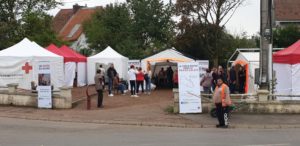
Deployment & Impact
The presence of the Pas-de-Calais Red Cross provided real psychological support. It breathed new life into a community that had been destroyed, by providing a place outside the walls, outside time.
Today, 15 months after the disaster, the links with the residents continue, and the Red Cross regularly receives invitations to house-warming events when the residents return to their renovated homes.
